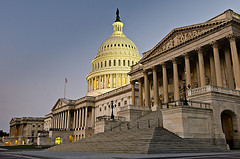Bond v. United States: Another Case of Constitutional Avoidance

The U.S. Supreme Court sidestepped the most complex issues in Bond v. United States in yet another case of constitutional avoidance. Rather than address the limits of the federal government’s power to implement international treaties, the Court ruled that the Chemical Weapons Convention simply did not apply.
The Facts
As many commentators have highlighted, the facts of the case appear to have been borrowed from a soap opera. Police arrested Carol Anne Bond after she was caught spreading chemicals around the home of her former best friend, who was involved in an affair with Bond’s husband. Bond was charged under a federal law implementing the United States’ treaty obligations under the 1993 Chemical Weapons Convention.
The History
Bond first appeared before the Supreme Court in 2011. In her first case, the Court ruled that Bond had standing to challenge the constitutionality of the statute under the Tenth Amendment. Thereafter, the Third Circuit Court of Appeals ruled that it was bound by the Supreme Court’s decision in Missouri v. Holland. In that case, the Court stated that “[i]f the treaty is valid there can be no dispute about the validity of the statute under Article I, § 8, as a necessary and proper means to execute the powers of the Government.” The Third Circuit and several other courts have broadly interpreted the statement to mean that laws passed pursuant to treaties are not subject to 10th Amendment scrutiny.
Bond again appealed to the Supreme Court. This time the issue before the Court was “whether the Constitution’s structural limits on federal authority impose any constraints on the scope of Congress’ authority to enact legislation to implement a valid treaty, at least in circumstances where the federal statute, as applied, goes far beyond the scope of the treaty, intrudes on traditional state prerogatives, and is concededly unnecessary to satisfy the government’s treaty obligations.”
As an alternative to tackling the continued relevancy of Missouri v. Holland, the Court also considered whether Chemical Weapons Convention Implementation Act could be interpreted not to reach ordinary poisoning cases, which it noted have been adequately handled by state and local authorities since the Framing of the Constitution.
The Majority Decision
In a unanimous decision, the Court overturned the conviction of Carol Anne Bond. However, in doing so, the majority only reached the less difficult question: whether the statute applied to Bond in the first place. It concluded it did not.
As highlighted by Chief Justice John Roberts, federal law overrides the states’ powers only if Congress clearly intended to do so. In this case, it “would mark a dramatic departure from that constitutional structure and a serious reallocation of criminal law enforcement authority between the Federal Government and the States” if the 1993 Chemical Weapons Convention applied to Bond’s conduct.
“The global need to prevent chemical warfare does not require the Federal Government to reach into the kitchen cupboard, or to treat a local assault with a chemical irritant as the deployment of a chemical weapon. There is no reason to suppose that Congress-in implementing the Convention on Chemical Weapons-thought otherwise,” Roberts further explained.
The Concurring Opinions
Justices Scalia, Thomas, and Alito each wrote concurring opinions. They concluded that the statute did apply, but was unconstitutional as an impermissible extension of Congress’s power.
Previous Articles
SCOTUS Decision in Bowe v. United States Is First of the 2026 Term
by DONALD SCARINCI on February 5, 2026
In Bowe v. United States, 607 U.S. ___ (2026), the U.S. Supreme Court held that Title 28 U.S.C. § ...
SCOTUS Rules State Can’t Immunize Parties from Federal Civil Liability
by DONALD SCARINCI on January 29, 2026
In John Doe v. Dynamic Physical Therapy, LLC, 607 U.S. ____ (2025) the U.S. Supreme Court held that...
Supreme Court to Address Racial Discrimination in Jury Selection
by DONALD SCARINCI onWhile the U.S. Supreme Court has concluded oral arguments for the year, it continues to add cases t...
The Amendments
-
Amendment1
- Establishment ClauseFree Exercise Clause
- Freedom of Speech
- Freedoms of Press
- Freedom of Assembly, and Petitition
-
Amendment2
- The Right to Bear Arms
-
Amendment4
- Unreasonable Searches and Seizures
-
Amendment5
- Due Process
- Eminent Domain
- Rights of Criminal Defendants
Preamble to the Bill of Rights
Congress of the United States begun and held at the City of New-York, on Wednesday the fourth of March, one thousand seven hundred and eighty nine.
THE Conventions of a number of the States, having at the time of their adopting the Constitution, expressed a desire, in order to prevent misconstruction or abuse of its powers, that further declaratory and restrictive clauses should be added: And as extending the ground of public confidence in the Government, will best ensure the beneficent ends of its institution.





